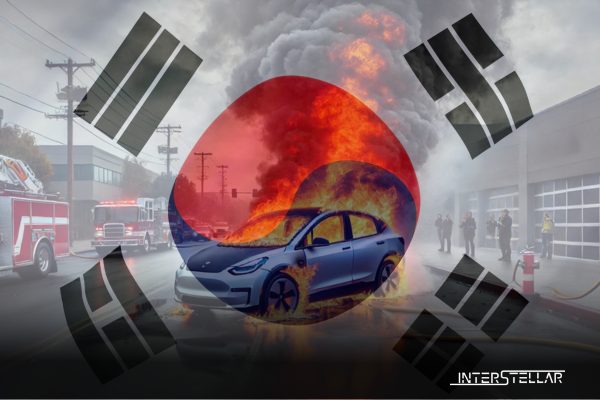South Korea Urges Automakers to Disclose EV Battery Details Amid Fire Safety Concerns
South Korea is set to urge automakers operating in the country to identify the batteries used in their electric vehicles (EVs). This move comes as authorities aim to address growing public safety concerns following a series of fires involving EVs. The government’s decision follows an incident on 1 August, where a fire broke out in an underground parking lot in Incheon, a city west of Seoul. The blaze, which started in a Mercedes-Benz EV equipped with Farasis Energy batteries, caused extensive damage, destroying or damaging around 140 vehicles and forcing residents of nearby apartments to seek temporary shelter.
Government Measures to Address Public Concerns
To alleviate public fears, the government will recommend that car manufacturers voluntarily disclose information about the batteries used in their EVs. “Such battery information has not been available to the public so far, and the measure is to reduce EV owners’ fire anxiety,” stated the Office of Government Policy Coordination. This move is seen as a response to the anxiety surrounding the safety of EV batteries, particularly after the Incheon fire, which took eight hours to extinguish.
Automakers and Battery Suppliers in the Spotlight
In light of recent events, some automakers have started to name the manufacturers of the batteries used in their EVs. Hyundai Motor and its luxury brand Genesis have disclosed that their EVs use batteries supplied by South Korea’s LG Energy Solution (LGES), SK On, and China’s CATL. Kia Corp has similarly stated that most of its EV batteries come from LGES and SK On, with a few models powered by CATL.
Mercedes-Benz Korea revealed that its EVs are mostly equipped with batteries from CATL and Farasis Energy, with some models using LGES and SK On batteries. The company is currently cooperating with authorities to determine the cause of the Incheon fire and has announced plans to offer free inspections for EV owners. BMW Korea, meanwhile, uses batteries mainly supplied by Samsung SDI, with a few models powered by CATL.
Industry Response and Public Perception
While some car companies have been forthcoming with battery information, South Korea’s major battery manufacturers, including LGES, SK On, and Samsung SDI, have declined to comment on which EVs use their batteries. CATL and Farasis Energy also did not respond to requests for comment.
Industry sources suggest that South Korea battery makers are unlikely to oppose the disclosure of where their batteries are used, but caution that the public should not automatically blame batteries for all EV fires. Experts, like Kim Jonghoon, a professor at Chungnam National University, argue that disclosing battery information is only a small step towards improving safety. He emphasised the need for advancements in battery management systems, which could offer more sophisticated and early warning systems to prevent fires. Kim noted that “EV phobia” could persist until more robust safety measures are in place.
Government and Industry Efforts to Enhance Safety
In response to the growing concerns, the South Korean government plans to conduct emergency inspections of fire-fighting equipment in multi-unit residential buildings of certain sizes. This measure is aimed at reassuring residents and mitigating the risk of fires in densely populated areas.
Auto experts have pointed out that EV fires differ significantly from those involving vehicles with internal combustion engines. EV fires often burn longer, are harder to extinguish, and have a tendency to reignite, posing unique challenges for fire-fighting teams. A report by the Seoul Metropolitan Fire & Disaster Headquarters revealed that out of 1,399 fires in underground parking lots between 2013 and 2022, 43.7% were caused by vehicles, with electrical sources accounting for 53% of car fires in these settings.





